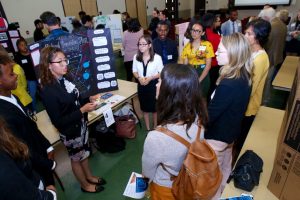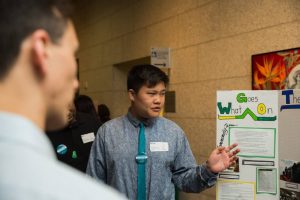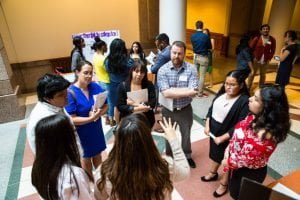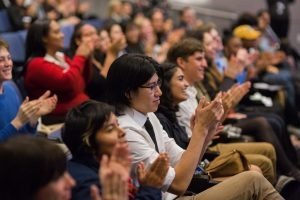Better Than Most is a regular feature of The Business of Giving, examining the best places to work among social good businesses and nonprofit organizations.
Denver: Generation Citizen empowers young people to become engaged and effective citizens, and their workplace culture looks to create the same for its employees. So, I went over to the New York City offices recently to check it out. We’ll begin with their CEO, Scott Warren, and then hear from some of the other members of the team.
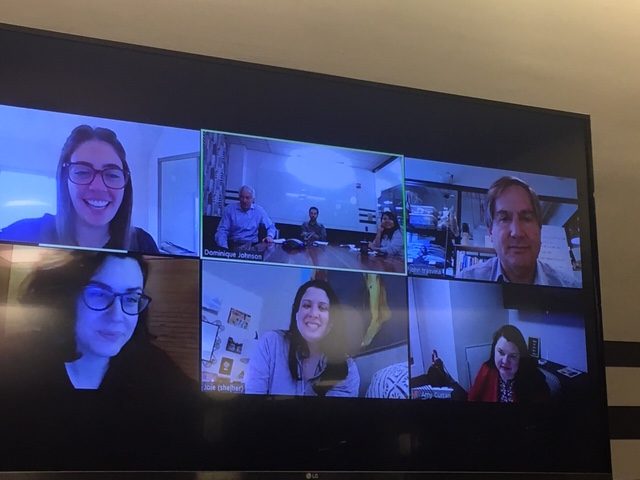
Scott Warren: I’m Scott Warren, our CEO. We have a mission of essentially ensuring that we are investing in young people to ensure that they help to create the democracy that we want to see rather than [potentially] the one that we have now. It also means that people are very dedicated to that concept of voice and democracy, and just like our own democracy is constantly evolving.
It doesn’t happen right away. And I also don’t think that there are ever right answers in democracy. I think that there are things that you try and push and see what happens. And so, it also leads, I think, to a culture of innovation where people are trying things out and hopefully feel like they can do that, too, because those new ideas are what’s needed, too.
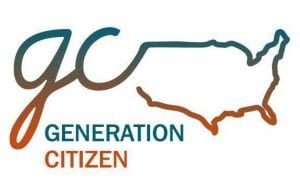 Lauren Hurlbutt: I would say that GC as a culture, it’s definitely a culture that works for people who are willing to just try things out, give it a shot, see how it goes, work on your own, and there’s always emotional support for that. I’ve never felt shamed for failing in the organization, but it is not, at this point, a space where you’re going to get a lot of people saying “You should do this, and this is how you should do it.”
Lauren Hurlbutt: I would say that GC as a culture, it’s definitely a culture that works for people who are willing to just try things out, give it a shot, see how it goes, work on your own, and there’s always emotional support for that. I’ve never felt shamed for failing in the organization, but it is not, at this point, a space where you’re going to get a lot of people saying “You should do this, and this is how you should do it.”
Scott Warren: You sort of have to be comfortable with a certain level of ambiguities to be here. And so I think that there are challenges to that, and sometimes people probably want to come in in roles and know exactly what they’re going to be doing. But I do think that the more that we can…I once heard someone say that the most effective organizations are when literally every single person in the organization can feel like an innovator, and I think that that’s something to aspire to. There’s a certain level of ambiguity that comes with that as well.
Amy Curran: I’m one of the older staff members by age in the organization. And so, it has been a lot of fun working with people a generation below me. There’s just a lot of learning that takes place in that kind of worldview, and I think that’s helped a lot in the innovation pieces of really helping teachers understand the shift in worldview with their students as well because they have the same thing every day.
My favorite day every year is super cliched, but it’s Civics Day — the day that our students, twice a year, bring together their projects — and they share it with the community. Every year, I am more taken aback by the quality of the projects, by the work that’s put in, and by the number of community members who are just leaving speechless because of the work that the students have done.
Maria Mares: I can’t say that it impacts all of them the same way. But just seeing students go from the very beginning of a semester not caring about the government or just not really understanding their role and just completely disillusioned, and then towards the end of the semester, seeing them have a better understanding of a lot of things, being encouraged, and knowing that it’s not going to be easy to make change but still feeling like they’re able to create change. I think to me, that’s one of the biggest things that keeps me here, and that makes me proud of doing the work. It’s our mission.
 Joie Golomb: What I find most exciting about my role, personally speaking, is we have program associates who are often one to three years out of college, and we’re working with college volunteers in our program model. And so I think to have those young voices on our staff and to elevate those voices and bring that perspective in, brings an exciting and challenging (sometimes) dynamic that I think keeps us on our toes and keeps us current and keeps us more grounded to the work. Because we’re always connecting deeply with our students or we’re trying to connect deeply with our students to elevate their voices, but just having those employees that also can bring that perspective keeps us fresh.
Joie Golomb: What I find most exciting about my role, personally speaking, is we have program associates who are often one to three years out of college, and we’re working with college volunteers in our program model. And so I think to have those young voices on our staff and to elevate those voices and bring that perspective in, brings an exciting and challenging (sometimes) dynamic that I think keeps us on our toes and keeps us current and keeps us more grounded to the work. Because we’re always connecting deeply with our students or we’re trying to connect deeply with our students to elevate their voices, but just having those employees that also can bring that perspective keeps us fresh.
Scott Warren: On the note of collaboration, we have different forms of celebration as well. One is that we have weekly updates that go out every week where every site talks about different things that are ongoing on their site. It could be victories that they’ve had different things that have happened in the classroom, different advocacy experiences, different things that they’re trying out. So I think that that’s something that goes out every Friday.
John Trasviña: I’m the new California Executive Director. I think it’s difficult having people all over the country. But I think from what I have been able to observe, the differences in geography and the distance has been very well-handled through technology, has a lot of meetings, video meetings. So I feel that I have colleagues all over the country. And I think through that lens, I think one of the major challenges of an organization like ours is to live that inclusion. And obviously, there are different ways of doing it, but it’s a challenge that GC takes on. So, it’s both externally, we’re trying to promote democracy and diversity, but internally, understanding the need to do the same.
Maria Mares: We have a diversity, equity, and inclusion advisory committee currently here in the organization. And so that’s been a thing for, I believe, the past two years. And so, it’s been something that’s really helped to push the organization forward because it’s a group of staff members who basically just come together, and I think we tend to push on certain things that staff members bring up to us, like certain issues and things like that. Some people within the management team are very receptive to it, and they’re also willing to grow themselves. But I think there’s also a lot of pushback sometimes. Even right now, we’re sort of grappling with what the role of that committee would be itself, and I think that’s just an example of it. But I also do see and recognize how the organization has been intentional about investing in diversity, equity, and inclusion. We hired consultants to work on a DEI plan for the organization, and I think that in itself is a really great thing because we’re investing in it.
Dana Inez: I’m on the operations team and we have a lot of projects. Something I’ve run is we created a staff quarterly engagement survey. An engagement survey is essentially like a satisfaction survey or whatnot. We use employee Net Promoter Score. And something that I was able to do once now and look forward to doing it next quarter is actually getting like a small cross-collaborative group that actually takes a look at all of the qualitative data, anonymize but broad data,and support in synthesizing.
Jessica Wise: So I feel like when I first was hired, I have like a 30-day check-in and a 60-day and a 90-day, and I never worked anywhere where people were asking me what I thought about much of anything. It was kind of like “you’re hired and you work and you do what you need to do, and if something comes up or if there’s a problem, then we address it at that moment.” But having Dana and having a manager that is constantly checking in just to see how I feel about the work that I’m doing, and how things are going in the classrooms, and how my communication is going with the teachers, is refreshing. And it just leaves a lot of room for me to feel comfortable if I have issues or even before issues come up. I feel very comfortable talking to folks about whatever I need to talk to them about.
John Trasviña: I would say that our onboarding is very, very effective, and it’s centered on communications. I consider onboarding to be two types: process onboarding and substantive onboarding. And in both of those, it always seems that there’s a system for everything, or we thought of a lot of different things. So we have expertise, subject matter expertise around the country on a variety of different areas, but on some of the processes, it’s the same way.
Lauren Hurlbutt: One of the things I really appreciate about working here is that it is an organization that is open to hearing critical feedback about the employee experience. My experience is that there are just a lot of basis to do it. There’s easy access to leadership. So leadership, Scott, as well our COO, Josh, make themselves available to hear those conversations. I have never felt pressure to “fall in line” to the cultural norms of the organization. My ideas have always been welcomed when it comes to thinking about how to make this an organization that works better for everybody.
Joie Golomb: I was talking about how we have a lot of teachers working here, and I think it’s something that I just always value in terms of the way that meetings and conversations… I think teachers make really good managers. The way that meetings and conversations are facilitated with specific prompts and prompts for reflection and ways just to start a conversation have built trust, and also have really pushed us to reflect and think critically about what’s working and what’s not working.
Scott Warren: And so, I think that maybe part of what I do appreciate is trying to move towards an authenticity of where people can be authentic about their experience — I think that the folks in this room, are on this call, embody that, and authentic about what’s working and what’s not — and that authenticity I think is so important to us functioning. And it’s interesting because I think that in our political environment, that is what people are drawn to right now. They are drawn to authenticity and being real and not a sense of like “we’re just going to tell you what you want to hear.” And I think whenever we get to a place where leadership… it seems like leadership is telling folks what they want to hear, they will push back. And I think that that’s a healthy thing to say.
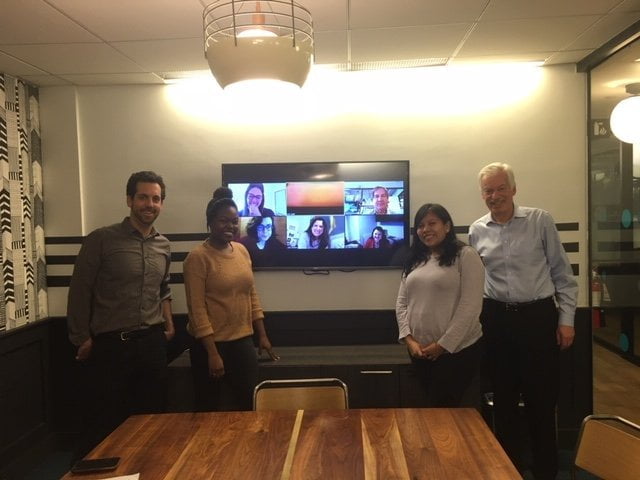
Denver: I’d like to thank all those who participated in this piece: Jessica Wise, Maria Mares, Dana Inez, Lauren Hurlbutt, Joie Golomb, Amy Curran, and John Trasviña. And if you would like to hear my full interview with Scott Warren, the CEO of Generation Citizen, just come visit denver-frederick.com.
Listen to more The Business of Giving episodes for free here. Subscribe to our podcast channel on Spotify to get notified of new episodes. You can also follow us on Twitter, Instagram, and on Facebook.


